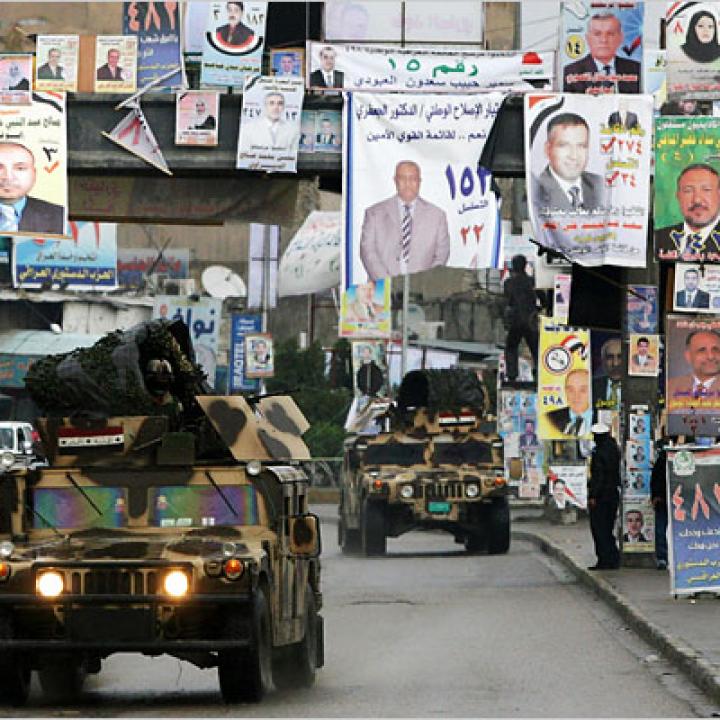
- Policy Analysis
- Fikra Forum
Fearing the Aftermath of the Elections: Will the Powder Keg in Iraq Ignite?

Recent polling shows that a majority of Iraqis anticipate that elections will lead to increased security and political problems as militias and dominant factors are expected to maintain control.
The importance of the early elections in Iraq coming in a few weeks is no secret. These will be the first elections imposed by the popular will represented in the Tishreen protest movement which began in October 2019. The strange paradox is that currently, it is the ruling political forces in Iraq who have become the strong defenders of the elections they initially resisted, while the ‘Tishreeni’ protesters have become the elections’ strongest opponents.
Observers of the electoral atmosphere in Iraq can clearly monitor the growth of youth campaigns to boycott the elections, and can likewise see that the traditional forces are the most active players on the electoral scene. At a time when traditional politicians confirm that they are responding to the rules of the democratic game that Iraqis have accepted by resorting to the election box as a means for change, those calling for a boycott now assert the inability of these elections as they currently stand to bring about the change they demanded in the Tishreen uprising.
Therefore, since the election date was announced several months ago, most Iraqis have expressed their lack of confidence in the ability of the elections to achieve the desired reforming effect on the Iraqi political scene. These views are clearly demonstrated in a public opinion poll conducted by the Independent Research Group in the spring of this year, which included a nationwide representative sample that was chosen in a multi-stage random probability sample (PPS) in order to represent all segments of Iraqi society.
The results of that poll—conducted through face-to-face interviews with about 2,000 Iraqis—confirm that among all Iraqis, only a minority believes that the most effective way to influence the political decision-making process is through voting. Of those who said ordinary Iraqis could influence the decision-making process, only 14% of Sunnis, 11% of Shia, and 31% of Kurds believed that voting is the way to do so.
Building on these results, a new nationwide representative PPS survey of 2,500 interviews conducted this month confirms that observers are right to be concerned over what might happen in Iraq after the elections. As outlined in a previous article six months ago, the important question now is no longer whether change will occur in the Iraqi political scene, but rather whether this change occurs via elections or via unrest outside of the political system.
The reality is that it is only a matter of time before some sort of change takes place in Iraq, and as time passes without bringing about that change through peaceful democratic mechanisms, the potential for violence and chaos grows greater. The new polling results demonstrate that the crisis of confidence is widening between the overall political system—not just the government—and the people. This is especially the case in the southern region of Iraq, which seems to be a powder keg just waiting for a spark.
Although 60% of Iraqis in general do not believe that the upcoming elections will lead to an improvement in the situation in Iraq, this percentage jumps among the Shia to about 70%—a remarkable majority.
Indeed, three out of four respondents in Iraq’s southern region said that the upcoming elections will actually increase the influence of the country’s current ruling parties. About the same percentage said they expected that the results of the elections would enhance the influence of the militias in their areas. Likewise, two out of every three Iraqis overall, and three out of every four Shia in particular, believe that the election results will lead to security and political problems in their areas—particularly concerning for Iraq’s safety measures.
On the other hand, the results of this poll, which indicate that the turnout rate of the early election will be no better than the low rates of the prior 2018 elections, raise additional concerns about the response in the southern regions after the announcement of the election results. Especially since all expectations indicate that the current political forces dominating the political scene will maintain power, the election outcomes will deeply frustrate those who participated while aspiring for change, and will confirm the doubts of those who boycotted because they were sure of the futility of the election mechanism.
As Iraqis lose hope for the future and experience heavy dissatisfaction—viewpoints confirmed by the most recent polling data—the threat of violence rises. This is a time when only one in three Iraqis—and only one in four Shia—feel that conditions in the country could improve within a year. Furthermore, while almost three out of four Iraqis say that they are satisfied with their lives, the percentage drops to less than two thirds when considering Shia respondents. In light of these views, it is not surprising that about 60% of all Iraqis expect the return of the October uprising after the elections. As for the areas where the uprising itself was initially centered in the South, the percentage jumps to more than 70%.
The above figures indicate beyond any doubt that there is concern over the possibility of security and/or political unrest in the post-election stage. The Iraqi government and political forces should prepare accordingly for a tumultuous fall and winter. Unless political forces are ready to make concessions similar to those they made to calm the street during the previous period, or even further concessions, the situation may develop into unimaginable consequences.



